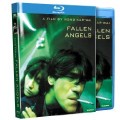| Reviews & Columns |
|
Reviews DVD TV on DVD Blu-ray 4K UHD International DVDs In Theaters Reviews by Studio Video Games Features Collector Series DVDs Easter Egg Database Interviews DVD Talk Radio Feature Articles Columns Anime Talk DVD Savant Horror DVDs The M.O.D. Squad Art House HD Talk Silent DVD
|
DVD Talk Forum |
|
|
| Resources |
|
DVD Price Search Customer Service #'s RCE Info Links |
|
Columns
|
|
|
Fallen Angels
Kino // Unrated // March 16, 2010
List Price: $29.95 [Buy now and save at Amazon]
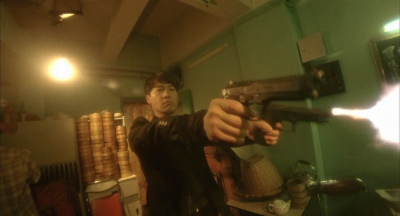 |
| [click on the thumbnail to enlarge] |
Wong Chi-Ming (Leon Lai) is a professional hit man. It's less glamorous than that might sound; months often pass between jobs, and in that seemingly unending downtime, he's forced to service debt collection for the local thugs to pay the rent on that spartan hotel room of his. He has no friends or great loves -- he doesn't allow anything to tie him to the world at large -- and Wong finds himself increasingly eager to leave this grueling life behind him. A devastatingly gorgeous assistant of his (Michelle Reis) may radiate an unflappable confidence, but she's distraught and lonely as well. Despite always having been kept at arm's length from Wong -- their communication takes place over the phone or through an arcanely-delivered series of messages -- she's hopelessly infatuated with him just the same. To make herself feel closer to Wong, she writhes in his bed when he steps out...she skulks around his favorite bar and even sits in his preferred booth.
The second story woven into Fallen Angels is that of He Zhiwu (Takeshi Kaneshiro) as he tries to carve out some sort of purpose in life. After wolfing down a can of expired pineapples as a child -- obviously a nod to Kaneshiro's turn in Chungking Express -- He was rendered mute. It's difficult enough to thrive in Hong Kong as it is, but opportunities are even more limited for someone who can't speak. He lacks the starting capital to get a business of his own off the ground, so he settles for the next best thing: breaking into other people's stores after hours. Oh, but some sort of common thief he's not; no, He just ensures that whether they want it or not, their businesses
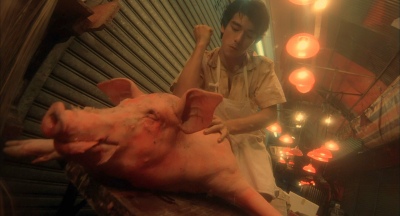 |
| [click on the thumbnail to enlarge] |
Fallen Angels is a film about people who are consumed by their obsessions, and I found myself entranced enough with Wong's movie that it's threatening to spark an obsession itself. As expected for a film of Wong's, it has little interest in fleshing out expansive character arcs or in weaving together a linear narrative. Fallen Angels does, on the other hand, delight in establishing an intriguingly offbeat tone. This is a movie whose IMDb credits include roles like "Woman Pressed to Buy Vegetables" and "Man Forced to Have His Clothes Washed" -- that has a mute giving a pig carcass a full-body massage or bounds from one apartment floor to another with a Molotov cocktail, unsure where his target lives, exactly -- and yet doesn't feel the least bit out of step tonally with its dark, sticky second story about sex and murder. Wong recognizes that a character doesn't necessarily have to be likeable to be compelling, and
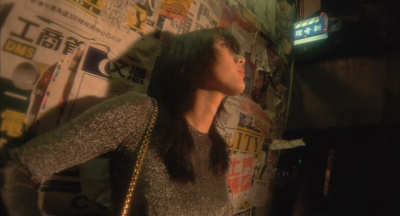 |
| [click on the thumbnail to enlarge] |
There's little evident structure propping up Fallen Angels, a film that instead is propelled by its startlingly evocative imagery. Some may dismiss it as an exercise of style over substance -- the neon streaks in the photography, the fish-eye lenses, its playfulness with frame rate, and its inventive use of color, to name just a few -- but I'd argue that Fallen Angels' style is its substance. Its stylized visuals infuse the film with a hypnotic energy, one that held an unrelenting grip on me throughout its 96 minute runtime. The handheld camerawork also adds a sense of immediacy and urgency, making me feel as if I'm a part of this unfamiliar world that would be lost if smooth, elegant camera movements had taken its place. The beats of the plot are seemingly inconsequential. Fallen Angels is more intrigued by establishing a certain mood and tone, and its razor-sharp visual eye never once fails to accomplish this. Among the film's greatest strengths is its ability to convey a sense of isolation in a city this densely packed and overpopulated, something Fallen Angels achieves through clever framing and the extensive use of wide angle lenses in tighter shots.
Fallen Angels is unstructured, kinetic, and compellingly bizarre...more of an experience than a movie in the traditional sense. Those entranced by Wong Kar-Wai's Chungking Express would do well to explore this companion piece as well, and Fallen Angels is a rewarding discovery for anyone adventurous enough to seek out a film this far left-of-center. Highly Recommended.
Video
Fallen Angels is defined by its hypnotic imagery, though the approach taken by Wong Kar-Wai and director of photography Christopher Doyle doesn't translate to a traditional high definition experience. The photography in Fallen Angels is frequently soft and is often cast in a warm, diffused glow. A number of shots, particularly those featuring Michelle Reis, have been shot with lenses that distort and exaggerate the imagery on-screen. Other moments deliberately ghost and smear, and the frame is generally drenched in one color or another. There's a sense of texture and clarity that outclasses what I'd expect an ordinary DVD to be able to produce, and some of the tighter shots in particular -- most memorably the close-ups that end the film -- are impressively detailed. Still, as remarkably striking as Fallen Angels is, viewers should be warned not to expect a sparklingly clean and clear image; that's simply not the sort of film it is. Given that intensely stylized approach, its presentation on this Blu-ray disc stands on the brink of perfection. Its gritty texture remains intact and looks marvelously filmic, showing no signs of being awkwardly smeared away through excessive noise reduction. The image isn't marred by any noteworthy speckling or wear either. The only shots in which that sort of damage is the least bit distracting come when Fallen Angels plays with its frame rate, and those imperfections were likely introduced during some sort of optical work and shouldn't be considered a flaw with this transfer. Also, despite Fallen Angels' challenging imagery, I couldn't detect any missteps or concerns with its AVC encode. This is as close to perfect a presentation of Fallen Angels as I could hope to see.
Fallen Angels is lightly letterboxed to preserve its original aspect ratio of 1.85:1. Its AVC encode and lossless soundtrack consume nearly 25 gigs on their own, and Fallen Angels' selection of extras spill over into the second layer of this BD-50 disc.
Audio
Presented
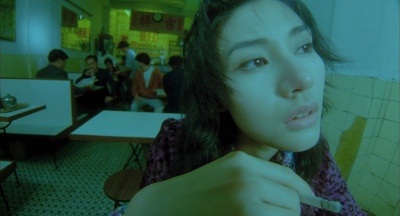 |
| [click on the thumbnail to enlarge] |
Nothing else in the track makes quite that same impression. Even with the gunplay scattered throughout Fallen Angels, the few shots that are fired don't snarl with the same ferocity as the music. There's an incredibly strong sense of stereo separation across the front channels, but use of the surrounds is sporadic. A few sequences are brimming with atmosphere in the rear channels, but many others I'd expect to be somewhat frenzied are entirely silent. For instance, there's a scene in a bustling restaurant in which I'd normally expect to hear background chatter and dinner noises attacking from behind, but instead the surrounds are completely quiet until coming to life with the background vocals of a song in the soundtrack. The more action-oriented moments do take advantage of the multichannel setup, though, especially as bullets whiz from one speaker to the next. The film's dialogue is rendered reasonably well, with the exception of a scene in an ice cream truck that sounds unusually hollow and dull. Fallen Angels' lossless soundtrack is a mixed bag, but I wouldn't expect a film like this to boast audio that sparkles and gleams, and what's offered here is certainly effective enough.
Optional English subtitles are enabled by default, and no other soundtracks or subtitle streams are offered on this Blu-ray disc.
Extras
- Only You (8 min.; SD): Writer/director Wong Kar-Wai touches on how Fallen Angels branches out from Chungking Express while reversing the roles of its characters. Following a brief note about how he sought to disrupt Takeshi Kaneshiro's traditional approach to comedy by having him play a mute, the remaining five or six minutes of the featurette are nothing but excerpts from the film.
- Whom You Miss (4 min.; SD): Profiled here is Chen Man Lei, the real-life manager of the Chungking Mansion Hotel as well as an actor in several of Wong Kar-Wai's films. Chen does a terrific impression of the director and laughs that he still has no idea what Fallen Angels is about, exactly.
- A Beautiful Ending (4 min.; SD): The third and final featurette on this disc delves into the making of Fallen Angels' finalé: a scene which, interestingly enough, was shot on the first day of production. "A Beautiful Ending" features quite a bit of behind-the-scenes footage, and Wong Kar-Wai explores the exaggerated photography as well as his unwavering confidence at the
time that he and his crew could shoot any film anywhere.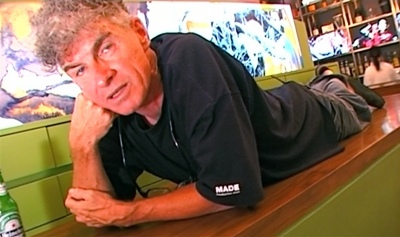
Director of Photography Christopher Doyle
- Interview with D.P. Chris Doyle (7 min.; SD): Easily the most fascinating of the extras on Fallen Angels is this borderline-surreal chat with cinematographer Christopher Doyle. He's holding a bottle of Heineken in his hand for the bulk of the interview, and I'm left with the definite impression that's not the only one he'd picked up that night. Rambling and on the brink of being completely unhinged, Doyle takes a stab at expressing the relationship between color and emotion, the camera's perception of the actors performing in front of it, and muttering something about the freewheeling collaborative process between Wong Kar-Wai and his crew. Spreading out on top of the bar at one point and later crouching down/bounding up again, Doyle is so deliriously far out there that I halfway expected to see the interview abruptly come to a close with men in white suits chasing after him with an oversized butterfly net. It's brilliantly mad and compellingly strange enough to demand a look.
- Trailers (4 min.; HD): High definition trailers for both Fallen Angels and Happy Together have been included as well.
- Still Gallery: The last of the extras on this Blu-ray disc is a gallery of 32 production stills and pieces of promotional art. Somewhat disappointingly, these images have not been rescanned with a high definition resolution in mind.
The interview and three featurettes are encoded in high definition but have been upscaled from low-quality, heavily interlaced sources. Fallen Angels comes packaged in a glossy cardboard slipcase.
The Final Word
Chungking Express certainly has a more accessible narrative and more immediately apparent substance than the companion piece reviewed here, but Fallen Angels is so visually entrancing that all other concerns are secondary. I can't claim with a single viewing that I altogether understand what I'm seeing here, exactly, though with as hypnotized as I am by the startling visual eye of Wong Kar-Wai and cinematographer Christopher Doyle, I'm sure I'll be returning to Fallen Angels for another examination soon enough. The stylized photography is nothing less than dazzling, though I wouldn't expect it to be an overwhelming improvement over Kino's most recent DVD release, and its lossless soundtrack is uneven but impressive enough when the film demands it. Fallen Angels' extras are, like Chungking Express before it, rather slim though certainly more substantial than the original DVD release in 2004. For admirers of Wong Kar-Wai who'd missed out on last year's DVD re-release, Fallen Angels is essential viewing. It's appreciated that Kino chose to price this Blu-ray disc the same as its most recent DVD, and, as I write this, the high definition release is also slightly less expensive on Amazon.com than last year's DVD. Highly Recommended.
|
| Popular Reviews |
| Sponsored Links |
|
|
| Sponsored Links |
|
|
| Release List | Reviews | Shop | Newsletter | Forum | DVD Giveaways | Blu-Ray | Advertise |
|
Copyright 2024 DVDTalk.com All Rights Reserved. Legal Info, Privacy Policy, Terms of Use,
Manage Preferences,
Your Privacy Choices | |||||||









